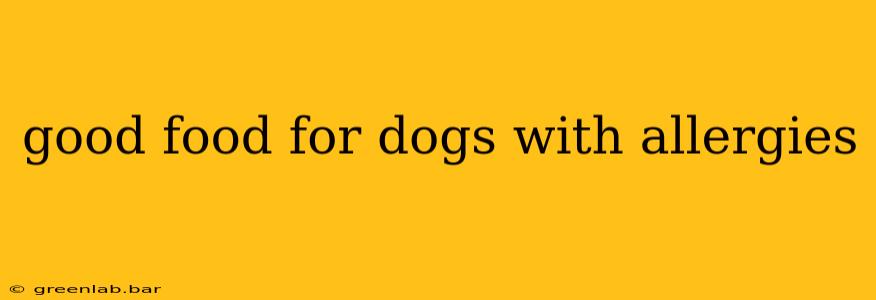Dealing with a dog with allergies can be challenging, but finding the right food is crucial for their health and happiness. Itchy skin, digestive upset, and even more serious conditions can stem from food allergies. This guide will explore the best foods for dogs with allergies, focusing on ingredients, preparation, and veterinary advice.
Identifying Food Allergies in Dogs
Before diving into food options, it's crucial to correctly identify a food allergy. Many symptoms can mimic allergies, including environmental factors. Common signs of food allergies in dogs include:
- Itchy skin: This is often the most noticeable symptom, manifesting as excessive scratching, licking, chewing, and hot spots.
- Gastrointestinal issues: Vomiting, diarrhea, gas, and changes in stool consistency are common.
- Ear infections: Recurring ear infections can be linked to food allergies.
- Paw licking: Excessive licking of paws can indicate an allergic reaction.
It's vital to consult your veterinarian. They can perform tests to pinpoint the specific allergen and rule out other potential causes. They can also help you develop a tailored dietary plan.
Best Foods for Dogs with Allergies: Ingredients to Consider
Once you know what your dog is allergic to, you can start choosing appropriate food. Here are some key considerations:
1. Novel Protein Sources:
This is often the cornerstone of an allergy-friendly diet. Novel proteins are those your dog hasn't been exposed to before, minimizing the risk of a reaction. Examples include:
- Rabbit: A lean and easily digestible protein.
- Venison: Another lean option with a unique protein profile.
- Duck: Similar to rabbit and venison in terms of digestibility.
- Bison: A relatively hypoallergenic option.
- Kangaroo: A less common but suitable protein source.
2. Limited Ingredient Diets (LID):
LID foods contain a small number of ingredients, reducing the chances of exposure to potential allergens. Look for foods that clearly list all ingredients and avoid artificial colors, flavors, and preservatives.
3. Hydrolyzed Protein Diets:
These diets break down proteins into smaller peptides, making them less likely to trigger an allergic response. They are often more expensive but can be very effective for dogs with severe allergies.
4. Grain-Free Options (with caution):
While grain-free diets are popular, it's crucial to remember that they aren't automatically allergy-friendly. Some dogs may be allergic to grains, but others may have sensitivities to alternative ingredients used in grain-free formulations. Always discuss grain-free options with your veterinarian. Recent studies have linked some grain-free diets to dilated cardiomyopathy (DCM) in dogs.
Preparing Food for Allergic Dogs at Home
While commercially available foods offer convenience, some owners prefer to prepare their dog's food at home. This allows for complete control over ingredients. However, home-prepared diets require careful planning and veterinary oversight to ensure nutritional balance. A veterinary nutritionist can help you create a recipe that meets your dog's specific needs and avoids allergens.
Beyond Food: Managing Allergies Holistically
Addressing food allergies is only part of the solution. Other management strategies may include:
- Regular bathing: Using hypoallergenic shampoos can help reduce skin irritation.
- Environmental controls: Minimizing exposure to known allergens in the environment.
- Medication: Your vet might prescribe antihistamines or other medications to manage symptoms.
Conclusion
Finding the right food for your dog with allergies is a journey that requires patience and collaboration with your veterinarian. By carefully considering ingredient choices, preparing food responsibly (if homemade), and employing holistic management strategies, you can significantly improve your dog's quality of life and alleviate their discomfort. Remember, always consult your veterinarian before making any significant changes to your dog's diet.

